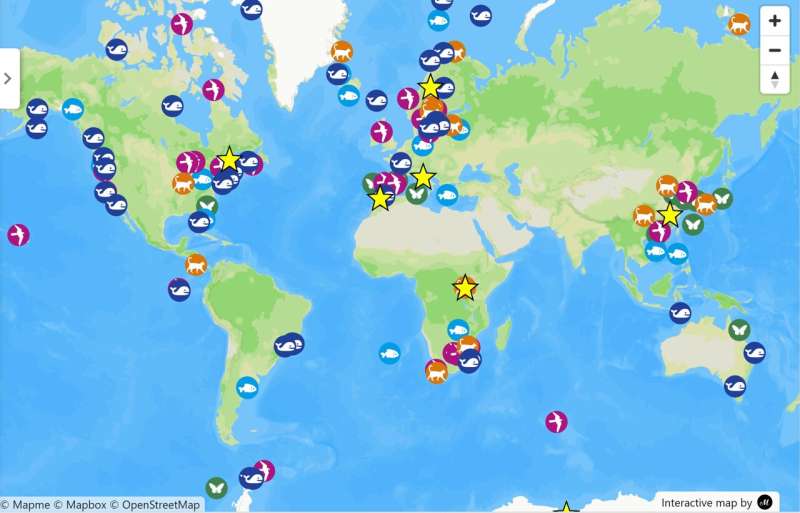-
Afterschool students learn about nature with Champions for Wildlife – The Tryon Daily Bulletin

Afterschool students learn about nature with Champions for Wildlife Published 10:38 am Wednesday, October 18, 2023 The Champions for Wildlife afterschool team for the Wildlife in Your Backyard series: volunteer David Riddle, outreach coordinator Karen Dacey, volunteer Jessica Glasscock and education coordinator Alexis Hinchliffe In the latest Champions for Wildlife monthly conversation in Polk County…
-
Afterschool students learn about nature with Champions for Wildlife – The Tryon Daily Bulletin

Afterschool students learn about nature with Champions for Wildlife Published 10:38 am Wednesday, October 18, 2023 The Champions for Wildlife afterschool team for the Wildlife in Your Backyard series: volunteer David Riddle, outreach coordinator Karen Dacey, volunteer Jessica Glasscock and education coordinator Alexis Hinchliffe In the latest Champions for Wildlife monthly conversation in Polk County…
-
WSB: Metal detectors uncover ingested fishhooks in turtles

Share this article Featured in This Article Wildlife Featured in this article Yellow-bellied slider Alligator snapping turtle October 18, 2023 by Joshua Rapp Learn Low-cost technology can give quick answers in field work Low-cost metal detectors no bigger than a flashlight can help researchers detect metal fishing hooks ingested by turtles. “I can see this…
-
WSB: Metal detectors uncover ingested fishhooks in turtles

Share this article Featured in This Article Wildlife Featured in this article Yellow-bellied slider Alligator snapping turtle October 18, 2023 by Joshua Rapp Learn Low-cost technology can give quick answers in field work Low-cost metal detectors no bigger than a flashlight can help researchers detect metal fishing hooks ingested by turtles. “I can see this…
-
Flame retardant pollution threatens wildlife on all continents, research finds

More than a hundred species of wildlife found across every continent are contaminated with highly toxic flame retardants, and the pollution is probably responsible for population declines in some species, a new analysis of published research shows. The dangerous chemicals have been detected in everything from sea urchins to bobcats to Arctic foxes, and at…
-
Flame retardant pollution threatens wildlife on all continents, research finds

More than a hundred species of wildlife found across every continent are contaminated with highly toxic flame retardants, and the pollution is probably responsible for population declines in some species, a new analysis of published research shows. The dangerous chemicals have been detected in everything from sea urchins to bobcats to Arctic foxes, and at…
-
Research tracking map shows wildlife polluted by flame retardants on massive scale

More than 150 species of wild animals across every contintent are contaminated with harmful flame retardant chemicals. Credit: Green Science Policy Institute More than 150 species of wild animals across every continent are contaminated with flame retardant chemicals, according to a new map tracking peer-reviewed research worldwide. Polluted wildlife include killer whales, red pandas, chimpanzees…
-
21 species have been declared extinct, the U.S. Fish and Wildlife Service says

Enlarge this image The historical range of the Bachman’s warbler included Alabama, Florida, Georgia, North Carolina, South Carolina, and Tennessee. U.S. Fish and Wildlife Service U.S. Fish and Wildlife Service Twenty-one species, including birds, a bat and several mussels, have been labeled extinct, the U.S. Fish and Wildlife Service said Monday. The species were previously…
-
21 species have been declared extinct, the U.S. Fish and Wildlife Service says

Enlarge this image The historical range of the Bachman’s warbler included Alabama, Florida, Georgia, North Carolina, South Carolina, and Tennessee. U.S. Fish and Wildlife Service U.S. Fish and Wildlife Service Twenty-one species, including birds, a bat and several mussels, have been labeled extinct, the U.S. Fish and Wildlife Service said Monday. The species were previously…
-
To Find Out How Wildlife Is Doing, Scientists Try Listening

BANGKOK — A reedy pipe and a high-pitched trill duet against the backdrop of a low-pitched insect drone. Their symphony is the sound of a forest and is monitored by scientists to gauge biodiversity. The recording from the forest in Ecuador is part of new research looking at how artificial intelligence could track animal life…